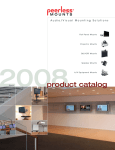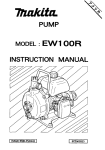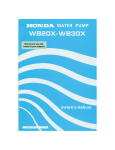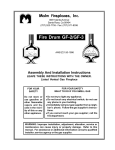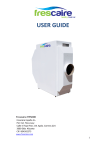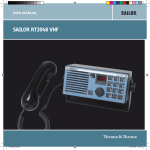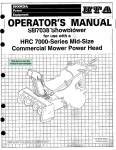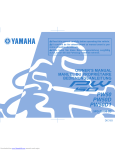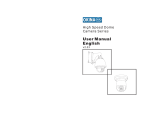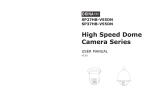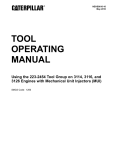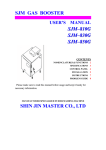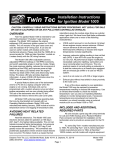Download Honda WB20T User's Manual
Transcript
Thank you for purchasing a Honda water pump. This manual describes operation and maintenance of the Honda WB20TWB30T water pumps. All information in this publication is based on the latest product information available at the time of printing. Honda Motor Co., Ltd. reserves the right to make changes without notice and without incurring any obligation. at any time No part of this publication permission. may be reproduced This manual is considered a permanent stay with the water pump if resold. without part of the water pump and it must READ THIS OWNER’S MANUAL CAREFULLY. these symbols and any instructions that follow: m written Pay special attention to -Indicates a strong possibility that serious injury or death could result if instructions are not followed. -Indicates a possibility that minor injury can result if instructions are not followed. 1 IMPORTANT NoTlCE 1 -Indicates that equipment or property damage result if instructions are not followed. NOTE: Gives helpful can information. Honda water pumps are designed to give safe and dependable service if operated according to instructions. Operating this water pump requires special effort on your part to ensure your safety and the safety of others. m Using this product for a purpose or property damage. Read and understand operating the water pump. not intended may cause injury this Owner’s Manual before If a problem should arise, or if you have any questions about your water pump, consult an authorized Honda water pump dealer. HONDA MOTOR CO., LTD. 1990, ALL RIGHTS RESERVED CONTENTS 1. 2. 3. 4. 5. 6. 7. 8. 9. 10. 1 1. 2 ....................................................... SAFETY INFORMATION ............................................. CbMPONENT IDENTIFICATION PRE-OPERATION CHECK . ..r .................................................. STARTING THE ENGINE ....................................................... OPERATION ....................................................................... ..................................................... l High altitude operation STOPPING THE ENGINE ....................................................... .................................................................. MAINTENANCE .................................................. TRANSPORTING/STORAGE .‘......................................... ................. TROUBLESHOOTING ................................................................ SPECIFICATIONS WARRANTY SERVICE .......................................................... 3 5 6 12 14 15 16 17 25 27 29 30 1. SAFETY INFORMATION Read these labels before you operate the water pump. 3 m To ensure safe operation- For safety, never pump flammable or corrosive liquids such as gasoline or acid. Also, to avoid pump corrosion, never pump sea water, muddy water, chemical solutions, or caustic liquids such as used oil, wine, or milk. Place the pump on a firm, level surface. If the pump is tilted or overturned, fuel spillage may result. To prevent fire hazards and to provide adequate ventilation, keep the pump at least 1 meter (3 feet) away from buildings and other equipment during operation. Do not place flammable objects close to the pump. A spark arrester is available as an optional part for this pump. It is illegal in some areas to operate an engine without a spark arrester. Check local laws and regulations before operating. Know how to stop the pump quickly, and understand the operation of all controls. Never permit anyone to operate the pump without proper instructions. Do not allow children to operate the pump. Keep children and pets away from the area of operation. Gasoline is extremely flammable and is explosive under certain conditions. Do not smoke or allow flames or sparks where the pump is refueled or where gasoline is stored. Refuel in a well-ventilated area with the engine stopped. Do not overfill the tank. Make sure that the filler cap is closed securely. Exhaust gas contains poisonous carbon monoxide. Avoid inhalation of exhaust gasses. Never run the pump in a closed garage or confined area. The muffler becomes very hot during operation and remains hot for a while after stopping the engine. Be careful not to touch the muffler while it is hot. Let the engine cool before storing the pump indoors. 2. COMPONENT PRlMiNG WATER FILLER CAP \ IDENTIFICATION CAP CHOKE LEVER AIR CLEANER MUFFLER THROTTLE LEVER *FRAME SERIAL NUMBER PUMP DRAIN PLUG DISCHARGE SPURT FUEL VALVE ENGINE SWITCH STARTER GRIP ~&RF CAP’ *ENGINE SERIAL NUMBER’ Record the frame and engine serial numbers for 1 our reference. Refer to the serial numbers when ordering parts, and when making technical or warranty inquiries (see page 30). Frame serial number: Engine serial number: 5 3. PRE-OPERATION 1. Suction CHECK hose (commercially available) Use a reinforced-wall or wire braided hose to prevent suction collapse. Since the pump’s self-priming time is directly proportional to hose length, a short hose is recommended. Secure the hose with the hose band. 1 IMPORTANT NoT’CE 1 Always install the strainer hose before pumping. Graiel or debris sucked serious impeller damage. on the end of the suction into the pump will cause STRAINER (optional parts) 2. Discharge hose (commercially available) When using a fabric hose, always use a hose band to prevent from disconnecting under high pressure. NOTE: A short, large-diameter improve efficiency. hose will provide lower fluid friction HOSE‘BAND (optional parts1 6 the hose and 3. Engine Oil ( IMPORTANT NOTICE 1 Running serious engine the engine with low oil level will cause damage. 1. Place the water pump on a level serface. 2. Remove the oil filler cap/dipstick and wipe it clean. 3. Check the oil level by inserting the dipstick in the filler neck without screwing it in. 4. If the level is low, fill to the top of the oil filler neck with the recommended oil. Use high-detergent, premium quality 4-stroke engine oil, certified to meet or exceed U.S. automobile manufacturer’s requirements for API Service Classification SG, SF/CC, CD. ( IMPORTANT NOTICE ] u sing shorten the engine’s service nondetergent life. oil or 2-stroke engine oil could SAE 1OW-30 ,is recommended for general, all-temperature use. Other viscosities shown in the following chart may be used when the average temperature in your area is within the indicated range. -30 -20 -10 10 20 30 40°C Ambient temperature f OIL FILLER HECK -- ---63 OIL FILLER CAP/ DIPSTICK b J 9 % w = =-z= -zz + : = --z == q -;--s - : .L 7 4. Fuel Unscrew the fuel filler cap. Check the fuel level. FUEL TANK CAPACITY: WB20T...2.7 WB30T...3.6 P (0.71 e (0.95 US gal, 0.59.lmp g,al) US gal, 0.79 Imp gal) Gasoline is extremely flammable, and gasoline vapor can explode. Use extreme care when handling gasoline. Keep gasoline out of reach of children. l Refuel in a well ventilated area with the engine stopped. Keep flames and sparks away, and do not smoke in the area. l Gasoline vapors or spilled gasoline may ignite. l Refuel carefully to avoid spilling gasoline. Avoid overfilling the fuel tank (there should be no gas in the filler neck). After refueling, tighten the fuel cap securely. If any gasoline was spilled, make sure the area is dry before starting the engine. l After use, store the water pump on a level surface. Be sure the storage area is well ventilated; do not allow flames or sparks in the storage area. After refueling, be sure to tighten the fuel filler cap firmly. FUEL FILLER CAP 8 Gasoline Recommendation Pump octane rating: 86 or higher We recommend unleaded gasoline because it produces fewer engine and spark plug deposits and extends the exhaust system life. If “spark knock” (metallic rapping noise) or persistent “pinging” occurs at a steady engine speed under normal load, change brands of gasoline. If spark knock or pinging persists, see an authorized Honda water pump dealer. 1 IMPORTANT NoTlCE 1 Running the engine pinging can cause engine damage. with perisistent spark knock or Running the engine with persistent spark knock or pinging is considered misuse, and the Distributor’s Limited Warranty does not cover parts damaged by misuse. Occasionally you, may hear light spark knock while operating under heavy loads. This is no cause for concern. It simply means your engine is operating efficiently. Never use stale or contaminated gasoline or an oil/gasoline getting dirt or water in the gas tank. mixture. Avoid 9 GASOLINES CONTAINING ALCOHOL If you decide to use a gasoline containing alcohol (gasohol), be sure its octane rating is at least as high as that recommended by Honda (see Gasoline Recommendation on page 9). There are two types of “gasohol”: one containing ethanol, and the other containing methanol. 1 IMPORTANT or gasoline also contain serious fuel I NoTiCE Using gasohol that contains more than 10% ethanol, containing methanol (methyl or wood alcohol) that does not cosolvents and corrosion inhibitors for methanol, can cause system damage and poor engine performance. Never use gasoline containing more than cosolvents and corrosion inhibitors. Honda cannot evidence endorse of its suitability 5% methanol, the use of gasoline containing even if it has methanol since is as yet incomplete. NOTE: Fuel system damage or engine performance problems resulting from the use of gasoline that contains alcohol is not covered under the warranty. Before buying gasoline from an unfamiliar station, first determine if the gas’oline contains alcohol; if it does, find out the type and percentage of alcohol used. NOTE: If you notice any undesirable operating symptoms while using a gasoline that contains alcohol, or one that you think contains alcohol, switch to a gasoline that you know does not contain alcohol. 10 5. Air cleaner Loosen the wing nut and remove the air cleaner cover. Check the element for dirt or obstruction. Clean the element if necessary (see page 20). AIR CLEANER AIR CLEANER I WING NUT 6. Priming water The pump chamber should be completely filled before operating. ppoRTANT NoTKE 1 Never attempt to operate the pump without priming water or the pump will overheat. Extended dry operation will destroy the pump seal. If the unit has been operated dry, stop the engine immediately and allow the pump to cool before adding priming water. PRIMING WATER FILLER CAP 11 4. STARTING THE ENGINE 1. Turn the fuel valve ON. 2. Close the choke lever. NOTE: Do not use the temperature is high. I 3. Turn the engine switch choke if the engine or the ambient CHOKE LEVER to the ON position. ENGINE SWITCH 12 is warm 4. Raise the throttle lever slightly. THROTTLE LEVER 5. Pull the starter grip lightly until resistance is felt, then pull it briskly. I 1 IMPORTANT NoT’CE Do not allow the starter grip to snap back against the engine. Return it gently to prevent damage to the starter. 13 5. OPERATION 1. As the engine warms up, gradually open the choke. CHOKE LEVER 2. Set the throttle at the desired speed. THROTTLE LEVER 14 High Altitude Operation At high altitude, the standard carburetor air-fuel mixture will be too rich. Performance will decrease, and fuel consumption will increase. A very rich fuel mixture may also foul the spark plugs and cause hard starting. High altitude performance can be improved by installing a smaller diameter main fuel jet in the carburetor and readjusting the pilot screw. If you always operate the engine at altitudes higher than 6,000 feet above sea level, have an authorized Honda water pump dealer perform this carburetor modification. Even with carburetor modification, engine horsepower will decrease about 3.5% for each 1,000 feet increase in altitude. The effect of altitude on horsepower will be greater than this if no carburetor modification is made. 1 IMPORTANT NOTICE 1 0 nce a carburetor is jetted for hiah altitude use, operation at lower altitudes without rejetting-may result inreduced performance, overheating, and serious engine damage. It is especially important to rejet a carburetor altitude to a lower one. At lower altitudes, become excessively lean. when going from a higher the air/fuel mixture may 15 6. STOPPING THE ENGINE 1. Move the throttle lever down fully. 2. Turn the engine switch to the OFF position. ENGINE SWITCH THROTTLE LEVER 3. Turn the fuel valve OFF. I FUEL VALVE NOTE: To stop the engine in an emergency, OFF position. 16 turn the engine switch to the 7. MAINTENANCE The purpose of the maintenance and adjustment schedule is to keep the pump in the best operating condition. Inspect or service as scheduled in the table below. m Shut off the engine before performing any maintenance. If the engine must be run, make-sure the area is weli ventilated. The exhaust contains poisonous carbon monoxide gas. 1 IMPORTANT NOTICE ] u se only genuine HONDA parts or their equivalent for maintenance or repair. Replacement parts which are not of equivalent quality may damage your water pump. Maintenance Combustion __ .- Fuel tank Schedule Chamber and strainer Impeller Impeller Casing Pump Fuel NOTE clearance Cover inlet line (1): (2): valve Clean-Lap 0121 valves Clean 012) Check 012) Check O(2) Check O(2) O(2) Check Check 1Rnnlar.e if nncnnnarvl Service more frequently when used in dusty areas. These items should be serviced by an authorized Honda dealer, is mechanically proficient. See the Honda Shop Manual. Every 2 years (2) unless the owner has the proper tools and 17 TOOL KIT Em) D SPARK PLUG WRENCH ) WRENCH HANDLE 10 x 12 mm WRENCH 3-G IO 18 14xl7mmWRENCH TOOL BAG 1. Oil change Drain the oil while the engine is still warm to assure rapid and complete draining. m Used motor oil may cause skin cancer if repeatedly left in contact with the skin for prolonged periods. Although this is unlikely unless you handle used oil on a daily basis, it is still advisable to thoroughly wash your hands with soap and water as soon as possible after handling used oil. 1. Remove the oil filler cap and the drain plug to drain the oil. 2. Reinstalj the drain plug and tighten securely. 3. Refill with the recommended oil (see page 7) to the specified OIL CAPACITY: 0.7 P (0.74 level. US qt) PLUG NOTE: Please dispose of used motor oil in a manner that doesn’t harm the environment. We suggest you take it in a sealed container to your local service station for reclamation. Do not throw it in the trash or pour it on the ground or down a drain. 19 2. Air cleaner service A dirty air cleaner will restrict air flow to the carburetor. To prevent carburetor malfunction, service the air cleaner regularly. Service more frequently when operating the pump in extremely dusty areas. m air cleaner Never use gasoline or low flash point solvents element. A fire or explosion could result. 1 IMPORTANT NOTICE ( N ever engine wear run the engine without for cleaning the air cleaner. the Rapid will result. 1. Loosen the wing nut, remove the air cleaner cover and remove the air cleaner element. 2. Wash the air cleaner element in a solution of household detergent and warm water, then rinse thoroughly, or wash in nonflammable or high flashpoint solvent. Allow the element to dry thoroughly. 3. Soak the element in clean engine oil, and squeeze out the excess oil. The engine will smoke during initial start-up if too much oil is left in the foam. 4. Reinstall the air cleaner element and the cover. AIR CLEANER ELEMENT AIR CLEANER COVER 20 3. Spark plug service Recommended spark plug: BP4HS-10 To ensure proper engine operation, ped and free of deposits. (NGK) the spark plug must be properly gap- 1. Remove the spark plug. m careful If the engine has be& not to touch the muffler. running, the muffler will be very hot. Be SPARK PLUG WRENCH 2. Visually inspect the spark plug. Discard it if the insulator is cracked or chipped. Clean the spark plug with a wire brush if it is to be reused. 3. Measure the plug gap with a feeler gauge. The gap should be 0.9- 1 .O mm (0.035-0.039 in). Correct as necessary by bending the side electrode. 0.9- 1 .O mm (0.035-0.039 in) ~ 21 4. Check that the spark plug washer is in good condition, spark plug in by hand to prevent cross-threading. 5. After the spark plug is seated, tighten press the washer. and thread the with a spark plug wrench to com- NOTE: If installing a new spark plug, tighten l/2 turn after the spark plug seats to compress the washer. If reinstalling a used spark plug, tighten l/8l/4 turn after the spark plug seats to compress the washer. 1 IMPORTANT NOTICE ] Th e spark plug must be securely tightened. An improperly tightened plug can become very hot and damage the engine. Never use a spark plug with an improper heat range. 22 4. Clean sediment cup Turn the fuel valve to the OFF position. Loosen the ring nut and remove the sediment cup and packing. Wash removed parts in solvent, dry them thoroughly and reinstall them securely. Turn the fuel valve ON and check for leaks. PACKING SEDIMENT CUP RING NUT 23 5. Spark arrester m Allow maintenance (optional part) If the engine has been running, it to cool before proceeding. the muffler will be very hot. 1. Remove the 8 mm flange nuts and 8 x 16 mm flange bolt and remove the muffler. 2. Remove the 6 x 6 mm and 6 x 10 mm flange bolts and muffler protector. 3. Check the muffler exhaust port for carbon deposits; clean if necessary. 4. Loosen carbon deposits in the muffler by lightly tapping around it with a plastic hammer. 5. Install the muffler and muffler protector securely. , 8 mm FLANGE NUT (2) MUFFLER PROTECTOR / 6xl2mmBOLTf2) 8 x 18 FLANGE 8&T Y (1) UFFLER . ,. ;a% \ , ’ EXHAUST 24 PORT 8. m the pump ignite. TRANSPORTING/STORAGE When transporting the pump, turn the fuel valve OFF and keep level to prevent fuel spillage. Fuel vapor or spilled fuel may Before storing the pump for an extended period; 1. Be sure the storage area is free of excessive humidity and dust. 2. Clean the pump interior before shutting down or the impeller may be damaged when restarting. After flushing, remove the pump drain plug, drain as much water as possible from the pump housing and replace the plug. 3. Drain the fuel . . . a. With the fuel valve in the ON position, remove the carburetor drain screw, and drain all the gasoline from the fuel tank into a suitable container. b. Reinstall the carburetor drain screw. m Gasoline is extremely flammable and is explosive under certain conditions. Perform this task in a well ventilated area. Do not smoke or allow fla’mes or sparks in the area during this procedure. DRAIN SCREW 25 4. Change the engine oil. 5. Remove the spark plug and pour about a tablespoon of clean engine oil into the cylinder. Crank the engine several revolutions to distribute the oil, then reinstall the spark plug. 6. Pull the starter rope slowly until resistance is felt. Continue pulling until the notch on the starter pulley aligns with the hole on the recoil starter (see illustration below). At this point, the intake and exhaust valves are closed, and this will help to protect the engine from internal corrosion. the mark on the starter pulley the hole at the top of the recoil 7. Cover the engine and pump to keep out dust. 26 9. TROUBLESHOOTING When the engine will not start: 1. Is the engine switch ON? 2. Is there enough fuel? 3. Is the fuel valve ON? 4. Is gasoline reaching the carburetor? To check, loosen the drain screw with the fuel valve ON. Fuel should flow out freely. m If any fuel is spilled, make sure the area is dry before testing the spark plug or starting the engine. Fuel vapor or spilled fliel may ignite. DRAIN SCREW 5. Is there a spark at the spark plug? a. Remove the spark plug cap. Clean any dirt from around the spark plug base, then remove the spark plug. b. Install the spark plug in the plug cap. c. Turn the engine switch ON. d. Ground the side electrode to any engine ground, pull the recoil starter to see if sparks jump across the gap. e. If there is no sparks, replace the plug. Install the new plug and try to start the engine according to the instructions. 6. If the engine still does not start, take the pump to an authorized water pump dealer. Honda 27 When the pump does not pump water: 1. Is the pump fully primed? 2. 3. 4. 5. 6. Is the strainer clogged? Are the hose bands installed securely? Are the hoses damaged? Is the suction head too high? If the pump still does not pump the water, take the pump to an authorized Honda water pump dealer. 28 10. Model Power WBPOT WB30T WZAL WZAN equipment description code Dimensions Length SPECIFICATIONS and Weight x Width x Height 460 x 360 (18.1 Dry weight x 440 x 14.2 23 kg (50.7 (mass) mm x 17.3 520 in) x 400 (20.5 lb) x 485 x 15.7 28 kg (61.7 mm x 19.1 in) lb) Engine Model Enaine 4-stroke, Displacement 144 (64 [Bore x Stroke1 Max. outout Max. torque cc (8.8 3.5 0.72 Cooling system lanition svstem side valve, 1 cylinder cu in) x 45 mm (2.5 197 x 1.8 in)] PS13.600 rpm kg-m ft-lb)/ (5.2 3,000 PTO shaft G200 G150 tvoe [67 cc (12.0 x 2.2 5.0 PS13.600 rpm 1.06 kg-m (7.7 2,800 rpm Forced cu in) x 56 mm (2.6 in)] ft-lb)/ rpm air C.D.I. Counterclockwise rotation, Pump Suction port diameter Discharae Rated Total oort diameter revolutions Self-priming 80 mm (3 in) 3.600 3.600 rpm 8 m (26.2 head 600 Capacity NOTE: 80 mm (3 in) 50 mm (2 in) 32 m (105 head Suction 50 mm (2 in) time Specifications 28 m (91.9 ft1 8 m (26.2 ft) P (158.4 US gal)/min llOsecat5m(16.4ft) are subject to change rpm without 1.100 150 ft) ft) P (290.4 set US gal)/min at 5 m (16.4 ft) notice. 29 11. WARRANTY Owner SERVICE Satisfaction Your satisfaction and goodwill are important to your dealer and to us. All Honda warranty details are explained in the Distributor’s Limited Warranty. Normally, any problems concerning the product will be handled by your dealer’s service department. If you have a warranty problem that has not been handled to your satisfaction, we suggest you take the following action: l Discuss your problem with a member of dealership management. Often complaints can be quickly resolved at that level. If the problem has already been reviewed with the Service Manager, contact the owner of the dealership or the General Manager. l If your problem still has not been resolved to your satisfaction, contact the Power Equipment Customer Relations Department of American Honda Motor Co., Inc. American Honda Motor Co., Inc. Power Equipment Customer Relations P.O. Box 50 Gardena, California 90247-0805 Telephone: (2 13) 604-2400 We will need the following - information Your name, address, and telephone Product model and serial number Date of Purchase Dealer name and address Nature of problem Department in order to assist you: number After reviewing all the facts involved, you will be advised of what action can be taken.. Please bear in mind that your problem will likely be resolved at the dealership, using the dealer’s facilities, equipment, and personnel, so it is very important that your initial contact be with the dealer. Your purchase of a Honda product is greatly appreciated by both your dealer and American Honda Motor Co., Inc. We want to assist you in every way possible to assure your complete satisfaction with your purchase. 30 MEMO MEMO




































